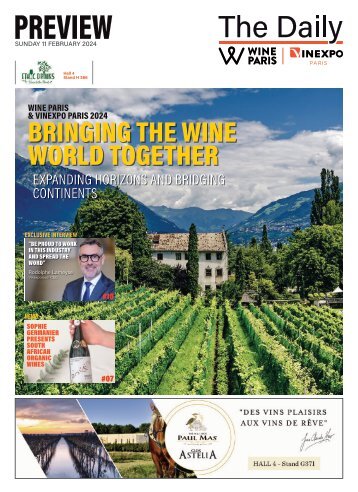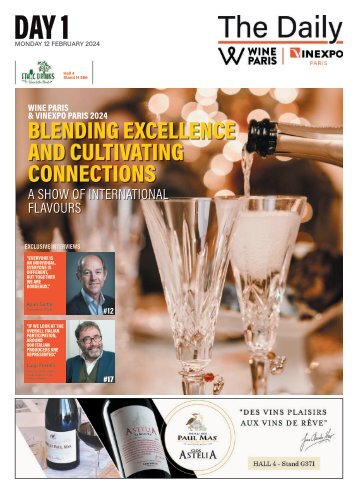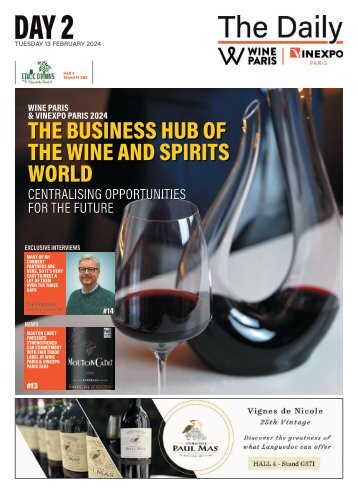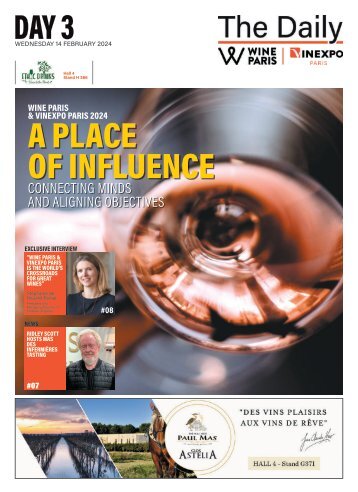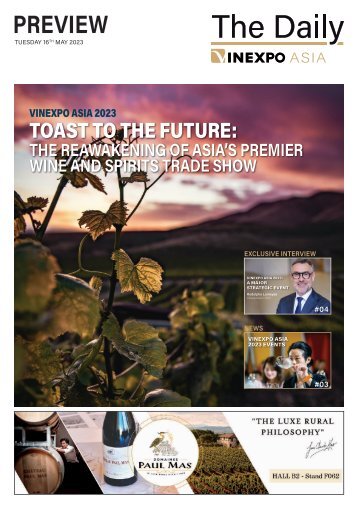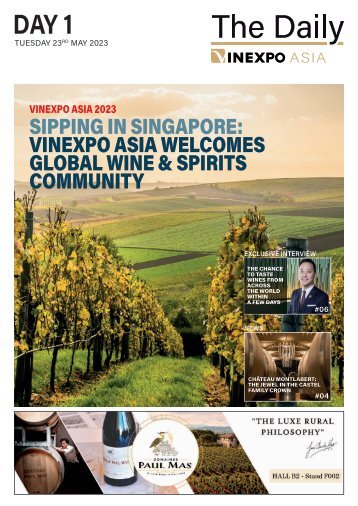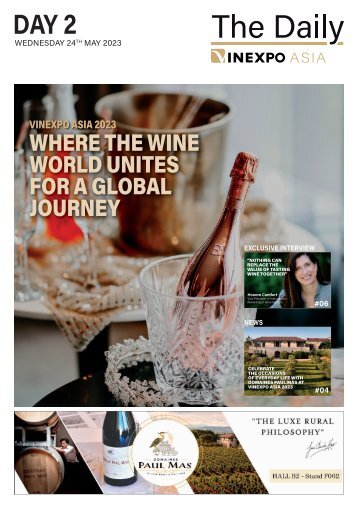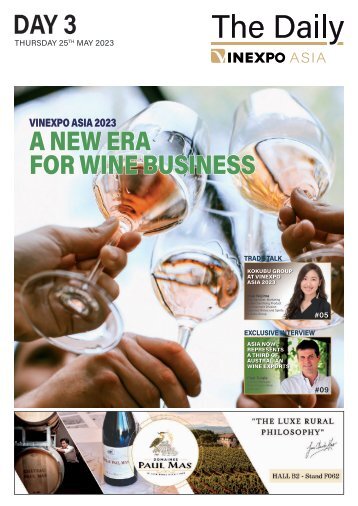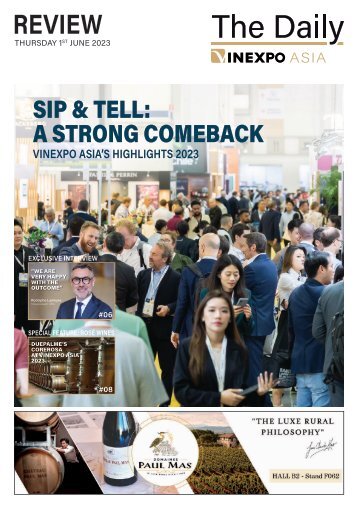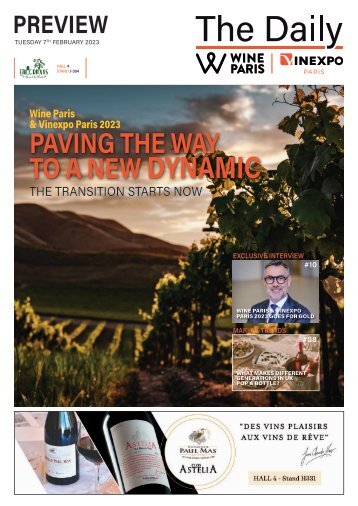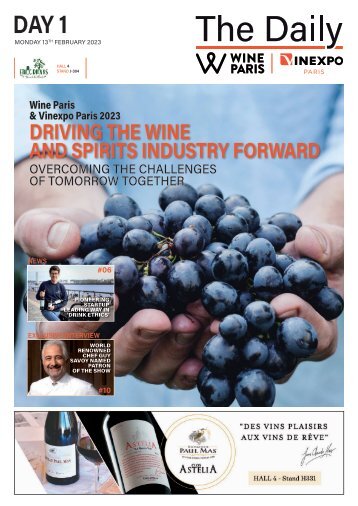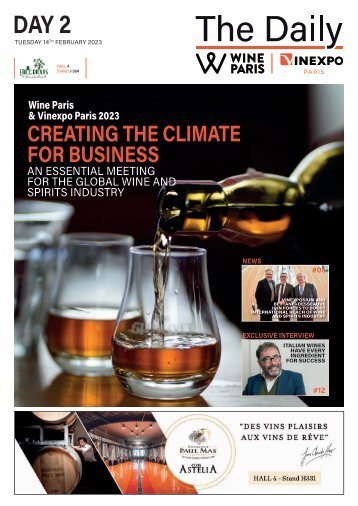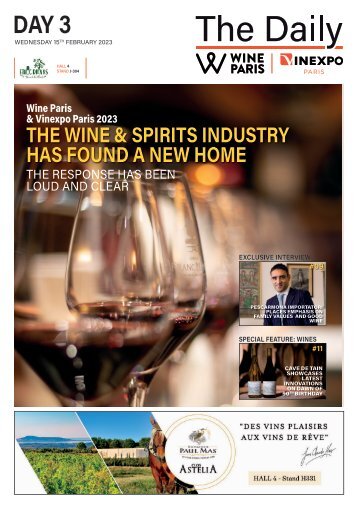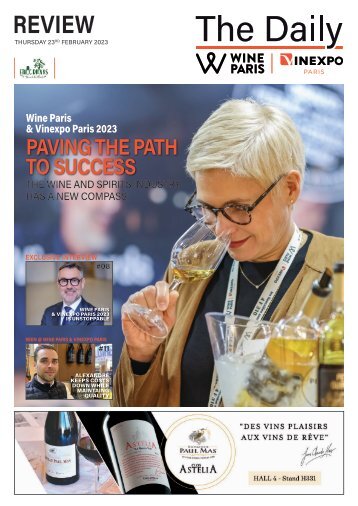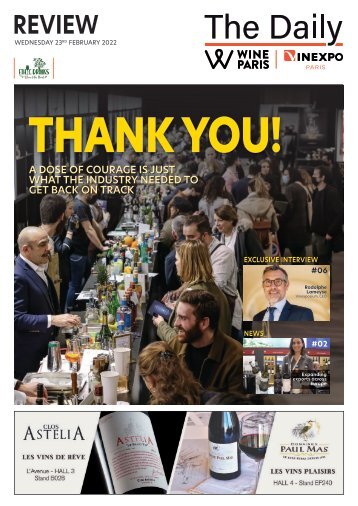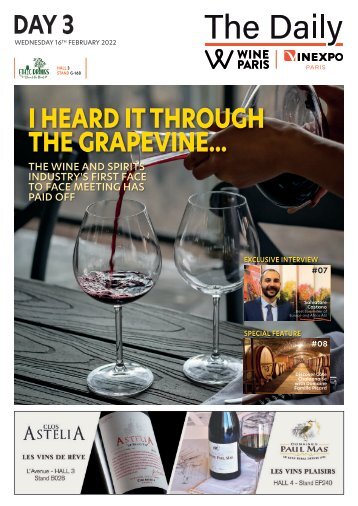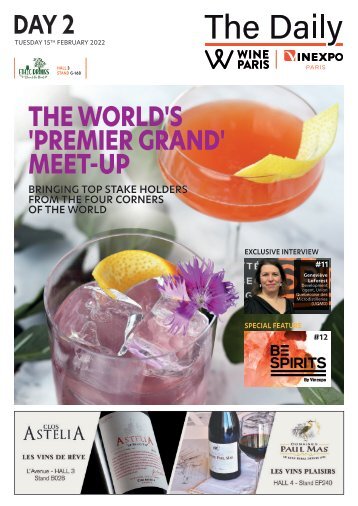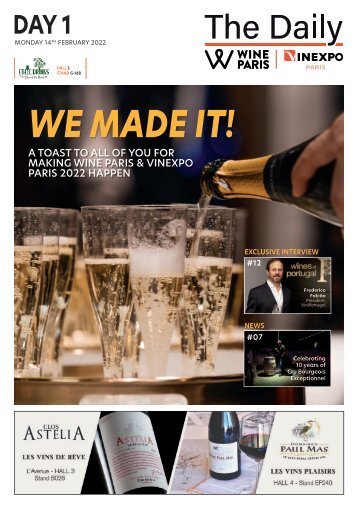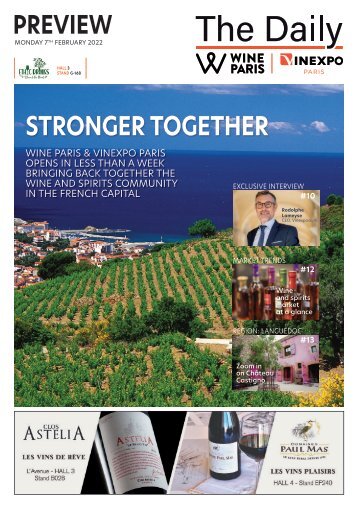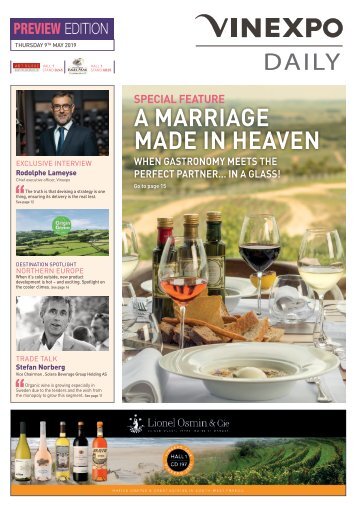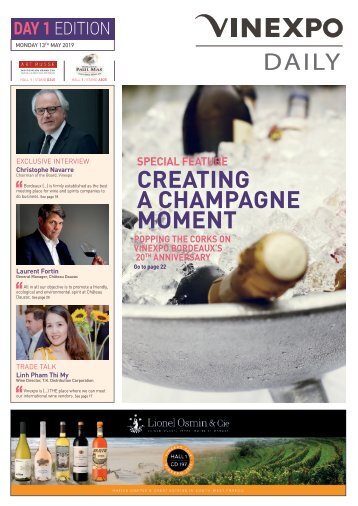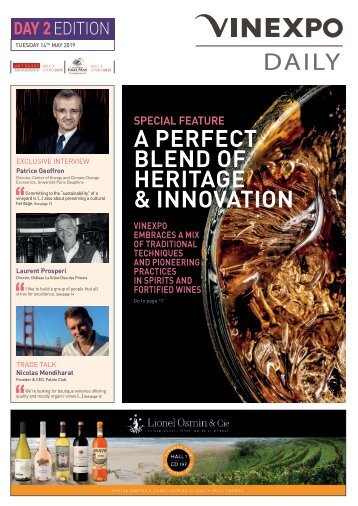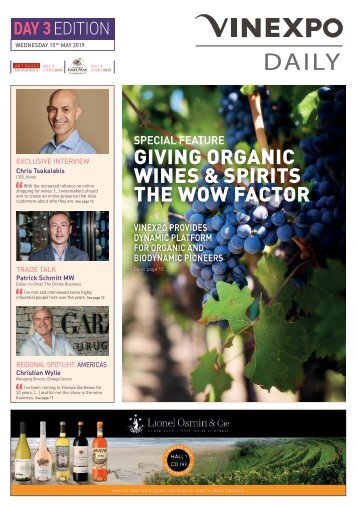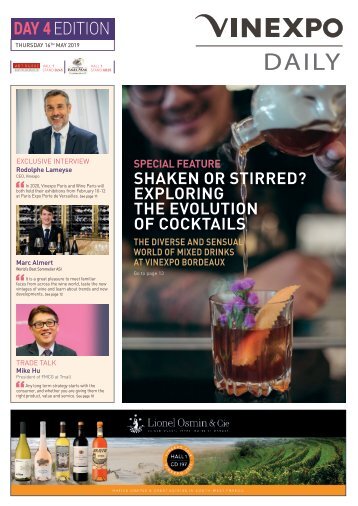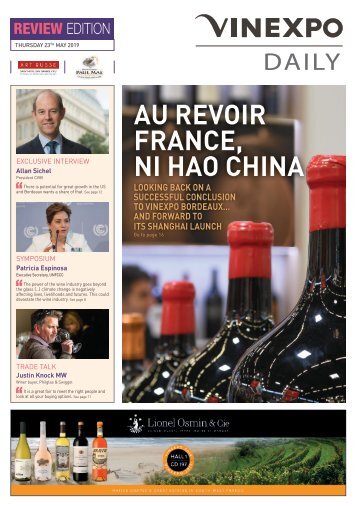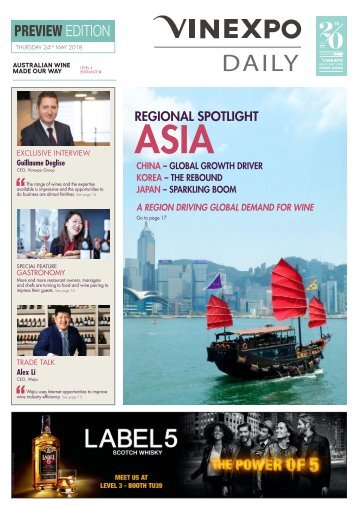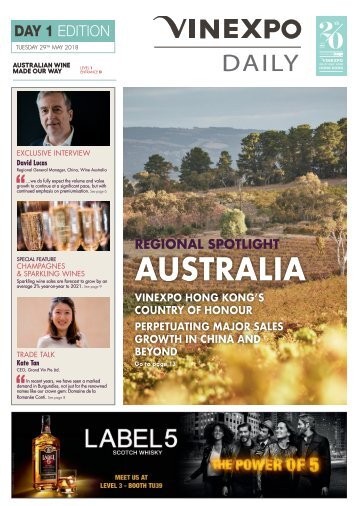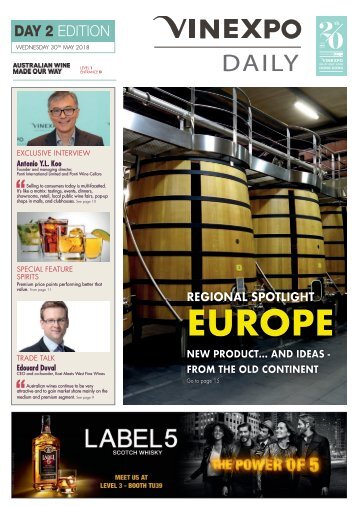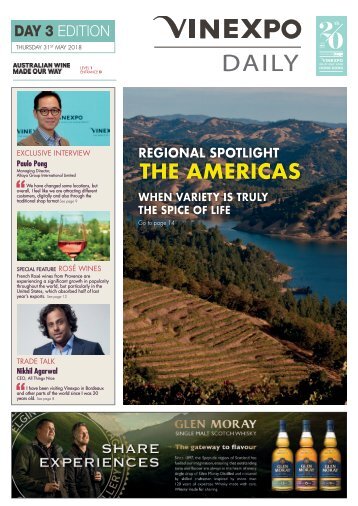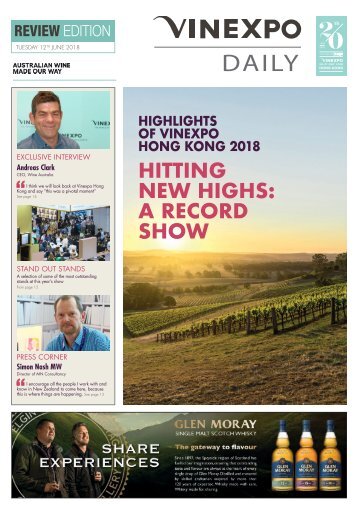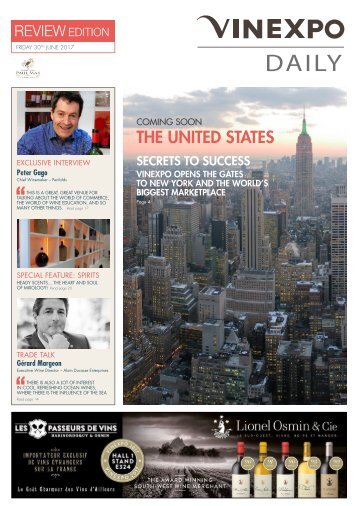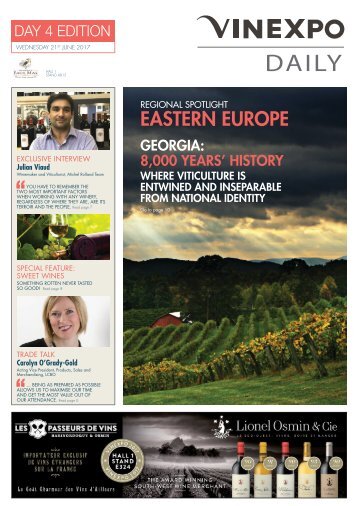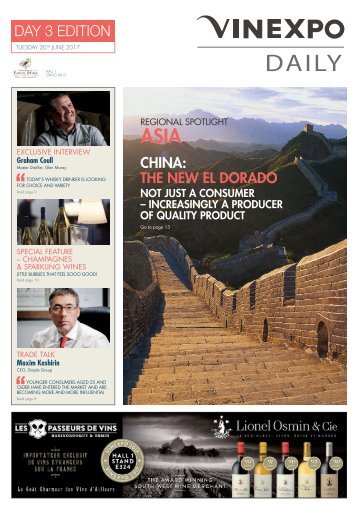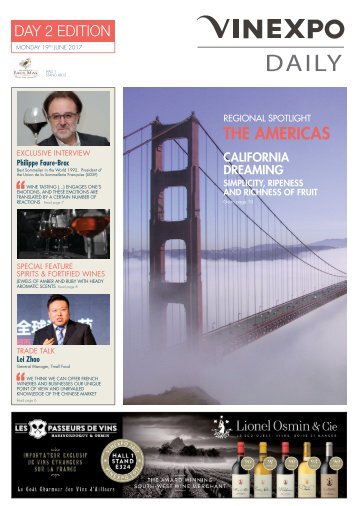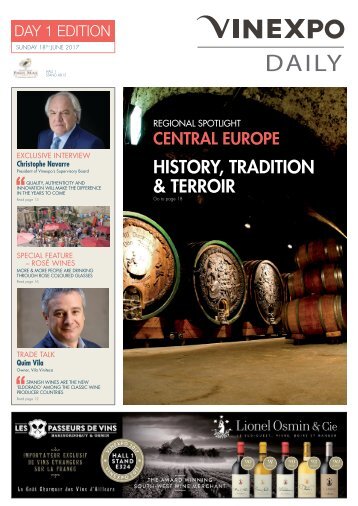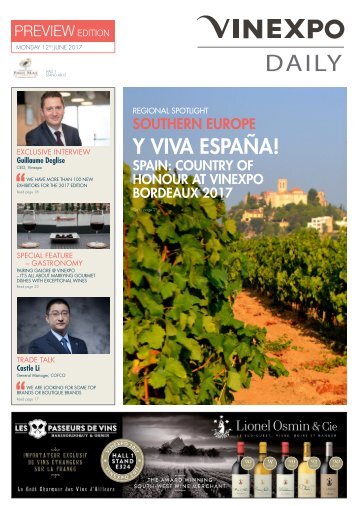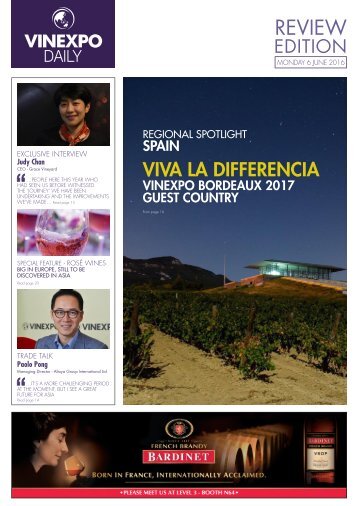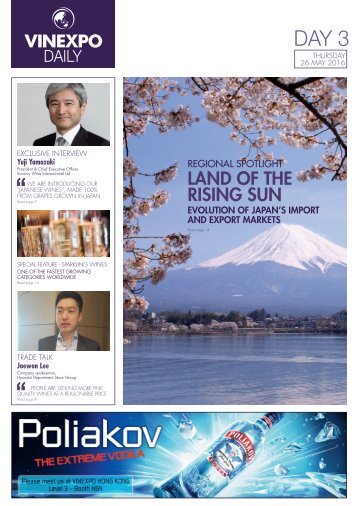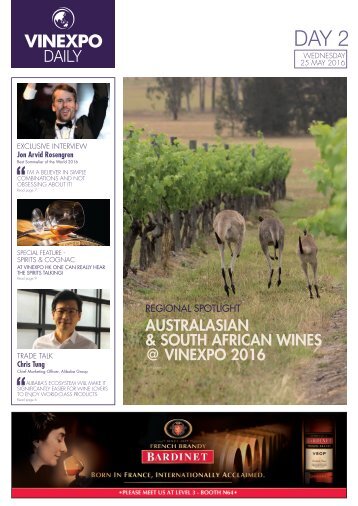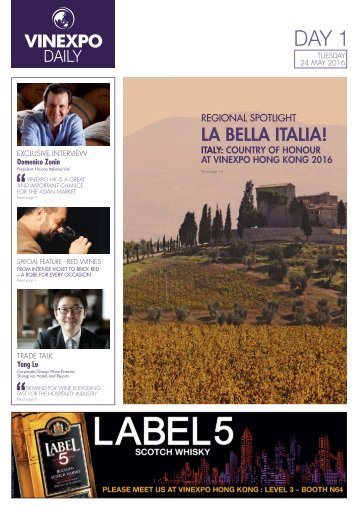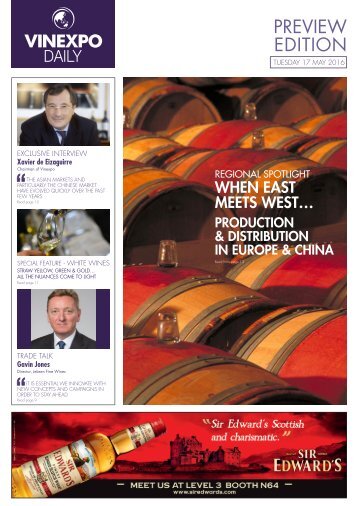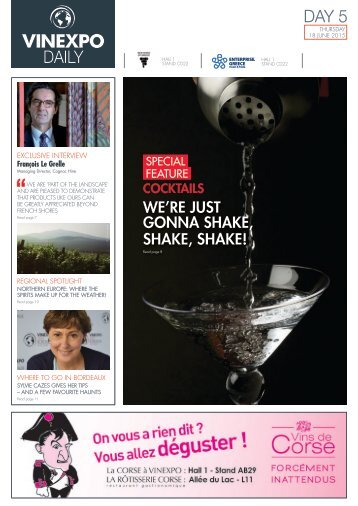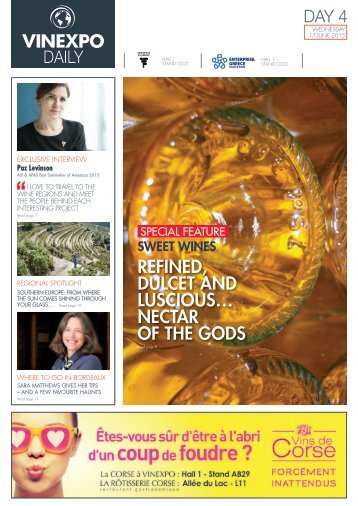Vinexpo Daily 2019 - Day 2 Edition
- Text
- Bordeaux
- Vineyards
- Bordeaux
- Vinexpo
- Wines
REGIONAL SPOTLIGHT:
REGIONAL SPOTLIGHT: EUROPE FRANCE ADVERTORIAL POSITIVE WINEMAKING, WHICH IS RESPECTFUL AND BENEFICIAL TO THE ENVIRONMENT, IS INTEGRAL TO OUR VALUES Jean-Claude Mas Founder and Executive Manager, Château Paul Mas Adding rural luxury to Chateau Paul Mas Jean-Claude Mas on life and his noetic approach to winemaking In 2000, Jean-Claude Mas created Château Paul Mas, named after his father Paul, a skilled grape grower who devoted his life to the vineyard. With grape growing expertise passing from father to son since 1892, Jean-Claude Mas has been able to steer his family towards the profession of winemaking, and since 2000, this expertise will pass from father to daughter. We caught up with him to learn more about the future of this family’s rich winemaking tradition. Please tell us about Paul Mas wines and the rich history behind it: Paul Mas wines are the result of a symbiotic harmony between an extraordinary region for producing wines, my passion for the vineyard, and a great winemaking and blending knowledge: the Paul Mas style. Inspired by the open-minded New World approach, we are capable of protecting our environment and respecting our rural roots. On our estates, innovation and tradition seamlessly combine to create a philosophy that we call Rural Luxury. Our aim is to produce wines that can spark real emotions. How did you decide to take a noetic approach to winemaking ? After 18 years’ experience devoted to research and discovery, striving with a passion to improve our understanding of Languedoc’s soils, climate, plants and vines – both clones and rootstocks - the time seemed ripe to reveal the exceptional terroirs that make up the family estates. Clos Astelia, Laurinya and Silénus – with the 2016 vintage - are the first releases. This truly noetic approach has allowed me to see a potential in my vineyards and offer wines never previously showcased until now. Positive winemaking, which is respectful and beneficial to the environment, is integral to our values. If our soils are teeming with life, like us, the vines perform better, and the wines are naturally more exquisite as a result. You received 14 Gold Medals at the 2019 Concours General Agricole in Paris, what makes these wines exceptional? The Concours General Agricole is open to producers only. Because of our vineyard ownership structure we can present wines from our different estates: 15 appellations, 45 grape varieties. Since we are able to control and shape the style of our wines from vineyard to bottle, we can be present in competitions and compete successfully in term of value for money but also in terms of image. Can you share the growth strategy behind your rosé range? My approach is primarily based on a judicious selection of grape varieties, with Cinsault first in line alongside two favorites naturally suited to creating rosé wines; Grenache gris and Pinot gris. Other varieties: Grenache noir, Mourvedre, Caladoc and Syrah bring that extra complexity I am looking for. Another important factor is selecting the most suitable terroirs for rosé production. Characterised by vigour, consistency and moderate hydric stress, the blocks of vines allocated to the production of rosé wine are worlds apart from those dedicated to red wines. The vines must have an active growth rate to create a good canopy suitable for making rosé wines focused on fruit and freshness. From pruning and all the way through the vine growth cycle, every aspect of the viticultural regime is adapted to this aim. Finally, the last major factor is selecting the most appropriate packaging to protect the wines. Rather than using traditional clear glass, rosé wines intended for ageing are packaged in bottles such as the Limited Edition Astelia bottle, or in glass with a protective sleeve to provide greater protection from light. How is climate change impacting you? Actually I tend to believe that in the Languedoc we are probably the least affected by this change thanks to our Mediterranean climate. The challenge to stay resilient to any climatic fluctuations is to revive our soils, maintain and develop biodiversity, be able to work with less water demanding vines, more resistant to heat and other vine diseases. In order to achieve the goal of a climate resistant wineyard we have to get better maturity at slightly lesser grades, adjust our canopy management and when needed use water in the most efficient way thanks to our variable rate drip irrigation system. What are you doing to keep innovating and maintain quality at the same time? General culture is key to innovation, I try to have an interest in many different fields, design, architecture, gastronomy, cars, motorcycle, paintings, martial arts, I spend a lot of time surrounding myself with nature, it’s a real source of inspiration. I learn by experience and by exchanging a lot with others. Meanwhile all these experiences stimulate my curiosity and fuel my creativity Hall 1 / Stand AB25 24 VINEXPO DAILY / DAY 2 / TUESDAY 14 TH MAY 2019
ADVERTORIAL DOMAINE CHIROULET: A BREATH OF CRU GASCON Richard Rottiers first Domaine des Malandes vintage Chablis producer Domaine des Malandes will be revealing Richard Rottiers’ first vintage at Vinexpo made by winemaker since he took over ownership of the property with his sister, Amandine. Richard and Amandine took over the property from their mother Lyne Marchive in 2018, who first founded the property in 1972. The Domaine now covers 29 ha across four Chablis appellations, including 3.8 ha of Petit Chablis, 15.9 ha of Chablis, 7.7 ha of Chablis Premier Cru and 1.3 ha of Chablis Grand Cru. Rottiers joins the family estate after making his name in Beaujolais where he has been producing wine with his own property, Château Thivin, in the heart of the Moulin à Vent since 2017. He is now head of both domaines: Domaine Richard Rottiers; and Domaine des Malandes. Constantly looking to upgrade and work with his soils to make better, more elegant wines that truly reflect their terroirs, Rottiers has been looking to move more of his production over to organic winemaking. The property only uses organic fertilisers and some of the land is plowed by horse to aerate the soils. His first organic project, Chablis ‘Envers de Valmur, will be available to taste on the Domaine des Malandes stand. The wine comes from 1.60 ha plot of land, first planted by his grandfather, André Tremblay in 2967, located behind Valmur Grand Cru Hall 1 / Stand E210-7 In less than 20 years, Domaine Chiroulet has become regarded as a Gascon Cru. The history of this Domaine might go back five generations, but it’s since Michel and Arlette Fezas took it over in 1969 that it has come to prominence. This is thanks not just to their passion to revive this ancient property, but also its location on rocky subsoils, full of limestone, silt and clay on the undulating slopes facing the Pyrenees. The Fezas family, now led by son, Philippe, has been able to make the most of these soils, shaped over millions of years of deposit and erosion. Those, along with the “chiroula” winds that whistle through the region, combine to make the distinctive Domaine Chiroulet wines. Each wine is carefully selected from a distinct parcel of vines grown in the right soils for that grape variety. In 2010 a new sustainable energy winery was built as part of the family’s vision to create a Cru Gascon. It is currently in the middle of an agroforestry project to better understand the biodiversity of its vineyards and surrounding areas. It is all in keeping with the Domaine’s philosophy: “What our land knows is reflected in the story of our wine...” New Rhône wines from Cellier des Princes A collaboration between the winemaker of Cellier des Princes, Thierry Ferlay, and acclaimed Grenache master winemaker, Philippe Cambie, will be one of the main attractions on this Rhône producer’s stand. Former French rugby star Philippe Cambie, who was named ‘Winemaker of the Year’ by US wine critic, Robert Parker in 2010, is regarded as one of the most eminent wine consultants working in the southern Rhône. He has worked with Cellier des Princes and Thierry Ferlay to create two new limited edition wines under the Hérédita label. The Hérédita is a blend of 70% Grenache and 30% Syrah from vineyards around Châteauneuf du Pape and is an elegant wine with notes of fresh red berries and liquorice, a velvety mouthfeel, with smooth tannins and spicy finish. The Châteauneuf-du-Pape Hérédita comes from hillside parcels of old vine Grenache in Courthezon and is 95% Grenache and 5% Mourvèdre to produce an intense wine with notes of kirsch, black fruits and blueberries and a long finish. Cellier des Princes is also launching a number of new brands at Vinexpo including two new rosés, La Princesse and A l’Ombre des Parosols, which are both a blend of Grenache, Syrah and Cinsault. It also has a wine from the promoted Cru of the Rhône valley, Le Mas des Falaises Cairanne and a new organic label, Autenti Hall 1 / Stand A151 Hall 1 / Stand E35-14 vinexpodaily.com VINEXPO DAILY / DAY 2 / TUESDAY 14 TH MAY 2019 25
- Page 1: DAY 2 EDITION TUESDAY 14 TH MAY 201
- Page 5 and 6: EDITORIAL AN INDISPENSABLE TOOL: TH
- Page 7 and 8: Air France and Vinexpo to renew par
- Page 9 and 10: An entracte break Domaine Tariquet
- Page 11 and 12: DOMAINE FOURREY CLAIMS A BURGUNDY F
- Page 13 and 14: EXCLUSIVE INTERVIEW WINEGROWERS MUS
- Page 15: Art Russe inspired by Grace of God
- Page 18 and 19: SPECIAL FEATURE: SPIRITS & FORTIFIE
- Page 21: REGIONAL SPOTLIGHT: EUROPE FRANCE D
- Page 26 and 27: REGIONAL SPOTLIGHT: EUROPE FRANCE C
- Page 28 and 29: REGIONAL SPOTLIGHT: EUROPE FRANCE A
- Page 30 and 31: REGIONAL SPOTLIGHT: EUROPE ITALY Le
- Page 32 and 33: REGIONAL SPOTLIGHT: EUROPE ITALY AD
- Page 34 and 35: REGIONAL SPOTLIGHT: EUROPE SPAIN Sp
Inappropriate
Loading...
Mail this publication
Loading...
Embed
Loading...
The Daily - Wine Paris / Vinexpo Asia
- The Daily Wine Paris & Vinexpo Paris 2024
- The Daily Vinexpo Asia 2023
- The Daily - Wine Paris & Vinexpo Paris 2023
- The Daily - Wine Paris & Vinexpo Paris 2022
- Vinexpo Daily - Bordeaux 2019
- Vinexpo Daily - Hong Kong 2018
- Vinexpo Daily - Bordeaux 2017
- Vinexpo Daily - Hong-Kong 2016
- Vinexpo Daily - Bordeaux 2015
- Vinexpo Daily - Paris 2020
- Media Kit 2019
